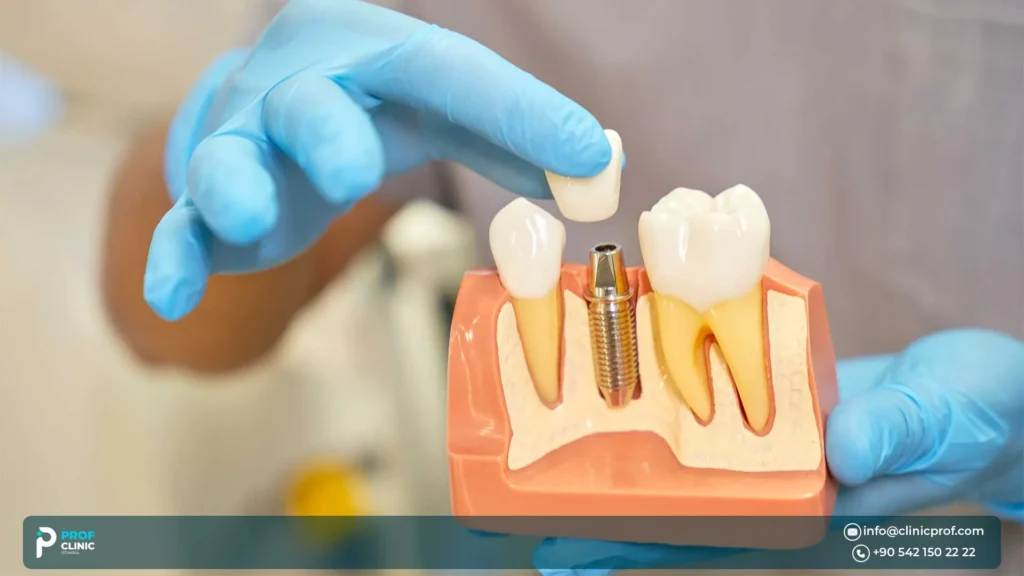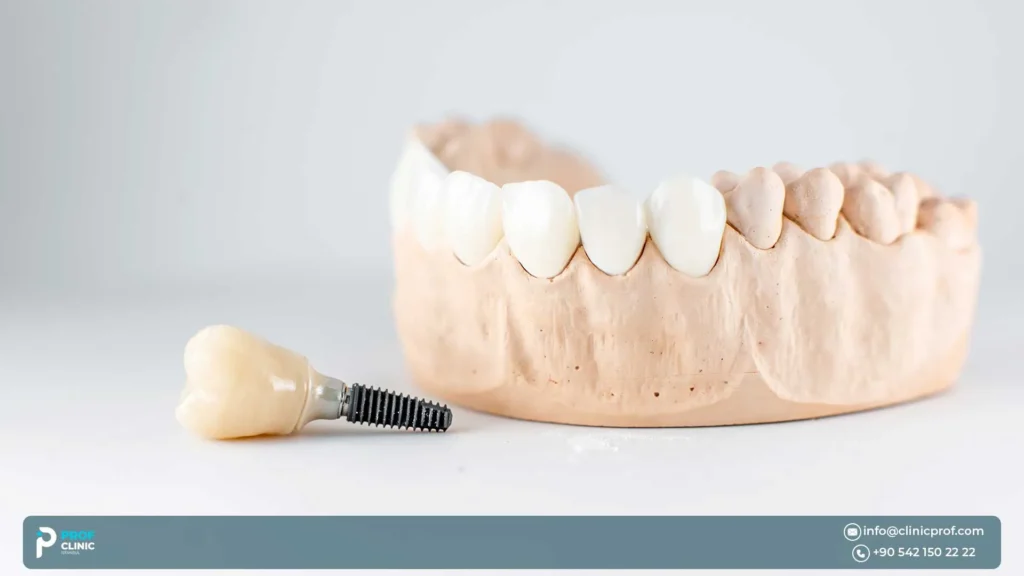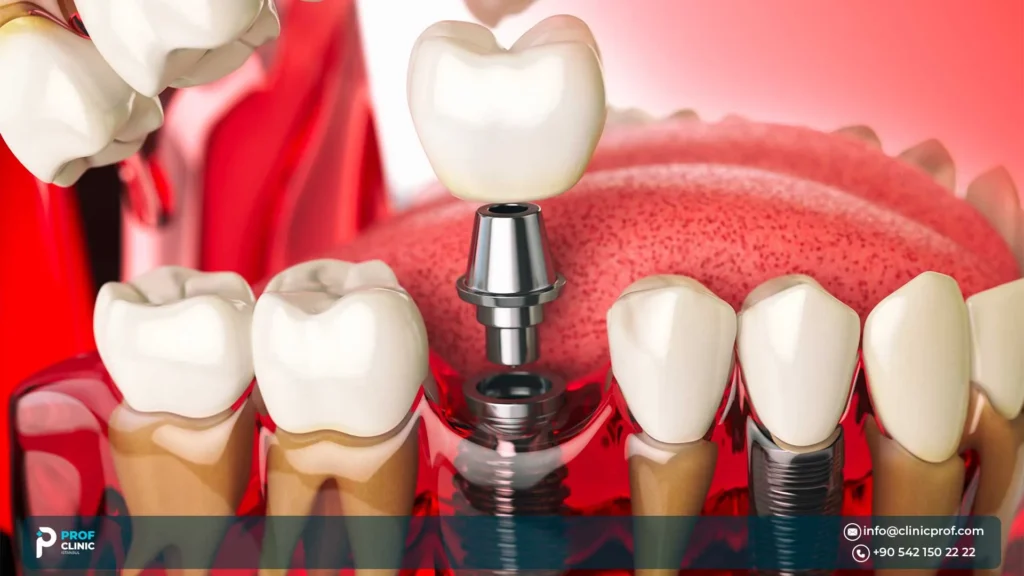Post-dental implant pain is a common concern for many, especially those striving for the perfect smile. At Prof Clinic, we understand the importance of clarifying the causes of this pain and how to manage it to ensure a comfortable and successful treatment experience.
In this article, you will learn about the causes of dental implant pain, the expected recovery timeline, signs of potential complications, and expert tips for pain relief and prevention. We also address frequently asked questions and explain why Prof Clinic is your ideal choice.
Is It Normal to Feel Pain After Dental Implant Surgery?
Yes, it is completely normal to experience some degree of pain or discomfort following dental implant surgery. This sensation is an expected part of the body’s natural healing process after any surgical procedure involving the gums and bone. The pain is typically mild to moderate in intensity and gradually decreases over the first few days following the procedure.
Also Read: What do dental implants look like?
What Kinds of Pain Are After Dental Implants?
After dental implant surgery, which involves placing a metal post into the jawbone, the body responds with a natural inflammatory reaction, leading to various sensations, including:
Mild to Moderate Throbbing Pain
You may experience a mild or moderate throbbing sensation or persistent pain that is typically not severe. This pain is usually localized at the implant site and may extend to the surrounding gums or jaw. It is often described as similar to the discomfort felt after a tooth extraction.
Sensitivity to Touch or Pressure (Hyperesthesia)
The area around the implant may be sensitive when touched or during activities like chewing or speaking. You might feel discomfort when applying pressure to the area, such as while eating or even lightly touching it.
Sensation of Bruising or Pressure
Since the surgery involves manipulating the jawbone, you may feel a sensation akin to a deep bruise or pressure in the bone. Due to changes in the tissues and jawbone, you might also experience a feeling of heaviness or tension in the area.
Swelling
Pain is often accompanied by swelling in the gums or face, which can contribute to a sensation of fullness, pressure, or discomfort. There’s no need to worry; swelling in the gums or cheek is common, especially within the first 48-72 hours.
Also read: Define Dental Implant: Comprehensive Guide
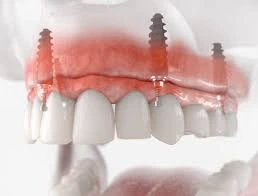
Dental Implant Healing Timeline
Pain After Dental Implants is an expected part of the healing process, but its intensity and nature change over time. This timeline depends on the body’s natural response to surgery, the quality of post-operative care, and individual factors such as oral health and adherence to medical instructions.
Understanding the expected timeline of pain after dental implant surgery can provide reassurance and help you distinguish between normal discomfort and signs that warrant concern. The healing process occurs in stages, with pain sensations predictably evolving as these stages progress.
Also read: Dental Implant Procedure Time
Pain After Surgery
- Expected Sensation: This is when pain and discomfort are at their peak. Once the local anesthetic wears off, you will begin to feel pain at the implant site.
- Nature: The pain is typically moderate in intensity, throbbing, or accompanied by a sensation of pressure and sensitivity. It is often accompanied by noticeable swelling in the gums and surrounding facial area, and bruising may also appear.
- Treatment: This is when prescribed pain relievers are most critical and effective. Cold compresses are also essential for reducing swelling and alleviating pain.
Pain After 5 Days
- Expected Sensation: At this stage, the pain should have noticeably subsided. Swelling should also be diminishing, and any bruising may peak before starting to fade.
- Nature: Some mild discomfort or sensitivity to touch may persist, especially when eating. However, the intense pain experienced in the first few days should have significantly reduced or disappeared.
- Treatment: If the pain remains as severe or worsens after the third or fourth day, it is advisable to consult your dentist.
Pain After Two Weeks
- Expected Sensation: By this stage, pain should have completely resolved for the vast majority of patients. Swelling and bruising should also have significantly subsided or disappeared entirely.
- Nature: You may feel slight sensitivity in the area if pressed firmly, but the bothersome pain associated with the surgery should no longer be present. The soft tissues (gums) will have healed well.
- Internal Experience: During this period, the process of osseointegration, where the implant begins to fuse with the bone, actively progresses. This biological process is typically painless.
Pain After Three Weeks
- Expected Sensation: At this stage, the implant’s integration with the bone should have significantly progressed or completed. You should not feel any pain related to the implant itself as a foreign body or as a result of the surgery.
- Internal Experience: The implant has become a stable part of the jawbone, functioning much like a natural tooth root.
Pain After a Year or More
- Expected Sensation: With a healthy, fully integrated implant, you should not experience any chronic or recurring pain associated with it.
- Healthy Implants Do Not Cause Pain: A successful implant behaves like a natural tooth root and does not cause pain under normal conditions.
However, always keep in mind that any pain that appears or persists after this period, or reoccurs after months or years, is a sign that requires immediate consultation with your dentist to identify and address the cause early. Your adherence to home care instructions and regular follow-up appointments plays a crucial role in ensuring healthy healing and the long-term success of the implant without pain. Book your free CONSULTATION with our teams to discuss the whole process
Also Read: Dental Implants Without Surgery: Is It Possible?
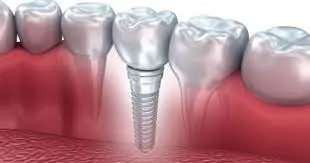
Causes Of Dental Implant Pain
- Inflammation at the Surgical Site: This occurs as a natural response of the body to surgical intervention and typically begins to improve within a few days.
- Bacterial Infection: An infection may develop at the implant site, leading to increasing pain, swelling, and redness.
- Peri-implantitis: An infection affecting the gums and bone surrounding the implant, a primary cause of delayed pain.
- Issues with the Prosthetic Component: Such as a loose screw, an ill-fitting crown, or excessive pressure on the implant.
- Failure of Implant Osseointegration: Improper fusion of the implant with the bone can cause movement and pain.
- Nerve Injury: In rare cases, a nearby nerve may be affected during surgery, resulting in persistent pain or numbness.
- Problems with Adjacent Teeth or Structures: Pain may stem from an issue with a nearby tooth or the jaw itself, not directly related to the implant.
Also read: Best Mini Dental Implants (MDI): pros, cons, cost
Warning Signs Your Dental Implants May Be in Trouble
While some degree of pain and swelling is normal after dental implant surgery, certain signs may indicate complications that require immediate attention. Being aware of these early warning signs can protect your oral health and the implant itself.
- Persistent or Excessive Swelling and Bleeding: If swelling does not begin to subside after a few days, or if bleeding is severe, persistent, and does not stop with gentle pressure, this may indicate an infection or a problem at the surgical site that requires evaluation.
- Implant Movement or Looseness: A newly placed implant should be completely stable. Any sensation of movement, even if slight, is a serious sign of failed osseointegration and requires urgent review.
- Fever and General Discomfort: A rise in body temperature accompanied by feelings of fatigue or malaise after surgery may suggest a systemic infection, necessitating immediate medical intervention.
- Persistent or Worsening Swelling and Bleeding: While mild swelling and bleeding are normal in the first few days, significant persistence beyond the third or fourth day, or worsening, may signal an infection or issue at the surgical site.
- Implant Movement or Looseness: A healthy implant should remain firmly in place. Any sense of movement, no matter how minor, is a critical indicator of failed osseointegration or severe inflammation around the implant.
- Fever and General Discomfort: Elevated body temperature and general malaise post-surgery may indicate that an infection from the implant site has spread to the bloodstream, requiring urgent medical treatment.
- Severe Pain Unresponsive to Painkillers: Normal pain can typically be managed with prescribed pain relievers. Intense pain that does not subside suggests a serious issue at the implant site, such as an infection or nerve-related problem.
- Pus or Foul-Smelling Discharge: The presence of abnormal or foul-smelling discharge from the gums around the implant is a clear sign of an active infection requiring immediate treatment.
- Persistent Numbness or Tingling: If numbness or tingling in the lips or chin persists long after the anesthetic wears off, it may indicate nerve irritation or injury during surgery, warranting further evaluation.
Also read: Does Getting Dental Implants Hurt? Before, During & After
How to relieve pain from dental implants?
Preventing pain after dental implant surgery largely depends on following proper guidelines to promote healing and reduce the risk of complications. Here are the key steps you can take:
- Follow Your Dentist’s Instructions Precisely: Strict adherence to post-surgical care guidelines ensures the best possible environment for healing and minimizes the likelihood of complications.
- Take Prescribed Medications on Time: Taking pain relievers before severe pain begins and antibiotics helps control pain and prevents infections that could intensify it.
- Use Cold Compresses: Applying cold compresses to the face reduces swelling and bruising, alleviating pressure and pain in the first few days.
- Maintain Gentle Oral Hygiene: Carefully cleaning the area around the implant with prescribed mouthwash or saline solution helps prevent bacterial buildup without disturbing the surgical site.
- Avoid Hard and Hot Foods: Consuming soft, cold, or lukewarm foods protects the surgical site from pressure and irritation that could increase pain.
- Refrain from Smoking and Alcohol: Smoking and alcohol impair the healing process and significantly increase the risk of infection and peri-implantitis, leading to pain and complications.
- Get Adequate Rest: Allowing your body to rest directs its energy toward effective healing and reduces stress that may heighten pain perception.
- Avoid Touching the Surgical Site: Manipulating the implant site with your tongue or fingers can introduce bacteria and hinder healing, potentially causing pain or infection.
- Attend Follow-Up Appointments: Regular visits to your dentist allow them to monitor healing and detect any issues early before they worsen and cause significant pain.
Also Read: Does Getting Dental Implants Hurt? Before, During & After

Why Trust Prof Clinic for Your Dental Implant Journey?
Choosing the right clinic for your dental implant procedure is a critical decision that determines the success of your treatment and your comfort. At Prof Clinic in Turkey, we are committed to delivering the highest standards of care, relying on a specialized medical team with extensive experience in precise dental implant surgeries and the latest technologies to ensure optimal outcomes.
Our focus on comprehensive planning tailored to your individual case, our comfortable environment, and our proven track record of success give you complete confidence that you are in trusted hands to achieve a healthy, beautiful smile that lasts for years. Contact us today and make your Implant journey professional.
Also read: Best Dental Implants in Istanbul Turkey
FAQs About Dental Implant Pain
How long does pain last after dental implant surgery?
The initial pain following dental implant surgery typically lasts for a few days, peaking within the first 48-72 hours. It gradually subsides and usually resolves for most people within one to two weeks as part of the natural healing process.
How to get rid of dental implant pain?
Ensure you take prescribed pain relievers on time and use cold compresses regularly during the first few days. Maintaining gentle oral hygiene and following a soft diet significantly contribute to reducing discomfort and speeding up recovery.
Why does my tooth implant hurt after 2 years?
Pain in the implant after two years is not normal and often indicates an issue, such as peri-implantitis or a problem with the prosthetic component above the implant. This pain requires immediate consultation with a dentist to diagnose and treat the cause.
Is it normal to have throbbing pain 2 weeks after a dental implant?
Throbbing pain two weeks after dental implant surgery is not normal, as natural pain typically resolves by this time. Persistent throbbing pain may indicate inflammation or a problem requiring examination by a dentist.
What is the most painful part of a dental implant?
The period immediately following the surgery, after the local anesthetic wears off, is the most painful stage of dental implant surgery. Pain is typically at its peak during the first 24 to 72 hours before it begins to gradually subside.
How long does it take for implant to stop hurting?
The normal pain associated with dental implant surgery typically subsides gradually within the first week. For most people, the pain either disappears or becomes minimal and non-disruptive within one to two weeks at most.
How long does nerve pain last after a dental implant?
Nerve pain or numbness after dental implant surgery, if caused by temporary irritation, may last for weeks or, in some cases, a few months. However, severe or persistent pain or numbness is not normal and requires immediate evaluation to determine and manage the cause.
Are you put to sleep for dental implants?
Not always. Most dental implant procedures are performed under local anesthesia, keeping you awake but pain-free. Sedation or general anesthesia may be used for complex cases or if you have severe dental anxiety.
How long does it take a dentist to put in an implant?
Placing a single dental implant typically takes 30 to 60 minutes, while multiple implants may require up to 2–3 hours, depending on complexity and the patient’s bone condition.
Should I get dentures or implants?
Choose implants if you want a permanent, stable, and natural-looking solution that preserves jawbone health. Opt for dentures if you prefer a quicker, less invasive, and more affordable option—though they may feel less stable and require periodic adjustments.


